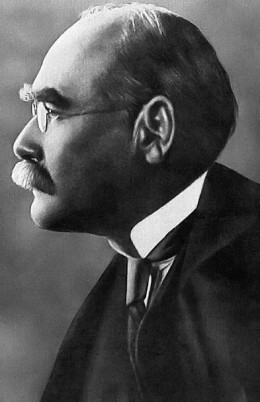The author of The Jungle Book and creator of icon characters like Rikki-Tikki-Tavi, Rudyard Kipling is one of the most praised and honored British writers of all time. Born in 1865 in Bombay, (now Mombai) and sent to be educated in England, Kipling learned at a young age to work and to learn. Rudyard Kipling may have been educated in England but he never left his birthplace roots as he was able to return to India in 1882 in order to work for a newspaper company. Being exposed to literature and having a passion for short stories, Rudyard Kipling was able to become one of the innovators in short stories.
The first writing of Rudyard Kipling’s was Departmental Ditties in 1886. He found greater success when he moved to writing poems, children’s literature, and short stories. As he moved into short stories, his fame rose quickly and in 1907 he became the youngest recipient to receive the Nobel Prize in literature. Not only is he still the youngest member to own the award, he was the first English author to receive this award in Literature.
Many of the writings that Kipling produced focused on British soldiers. He took ordinary soldiers and told their stories and glorified them, making these stories affectionate and also brought in a large emotional appeal to them. Some of the stories about soldiers included the following:
- Plain Tales from the Hills
- Soldiers Three
- Barrack Room Ballads
The story that brought a lot of fame to Rudyard Kipling was The Jungle Book in 1894. This iconic story is still treasured by many children today and has led to characters that are well-recognized in many different cultures. Upon the immense popularity that Kipling was experiencing he decided to continue to write adventure novels and short stories. Some of his most popular works include the following:
- Kim
- The Second Jungle Book
- The Day’s work
- Captains Courageous
- Debits and Credits
- Puck of Pook’s Hill
- Limits and Renewals
Kipling also wrote short stories and poems about World War I in order to raise awareness. Initially supporting the UK, Kipling later wrote propaganda books about the War. Kipling was known to be proud of his heritage and was very sympathetic toward the British Empire. He wanted to see the British Empire continue to grow and expand and actually wrote many essays and short stories about it. Kipling lost his son John to World War I.
Rudyard Kipling’s ability to tell exciting and engaging stories have been able to create some of the most vivid characters in our society. His book The Second Jungle Book was published in 1895 and this was the inspiration for the 1967 Disney animated feature film, The Jungle Book.
While his literary works were well known, one of his poems is still favored in Britain. The poem “If—“ helped to cement Rudyard Kipling’s place among one of the best poetic writers. One of the most popular sentences from “If—“ is as follows “IF you can keep your head when all about you / Are losing theirs and blaming it on you..” In addition to this popular poem he was also hailed for Mandalay.
It is important to know that Rudyard Kipling was able to write creative and imaginative works after having such a tragic life. He was beaten as a child and ended up suffering from insomnia all of his life due to the harsh beatings. He also experienced the loss of his 2 children, John and Josephine. These tragic losses caused his work to slow and he was unable to return to his popularity and ended up dying in 1936 from illness.


Leave a Reply